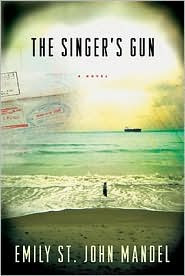 Pintoff is currently at work on her third novel, which will appear in 2011. A former lawyer and academic, Pintoff lives in Manhattan’s Upper West Side with her husband, daughter, and their family dog.
Pintoff is currently at work on her third novel, which will appear in 2011. A former lawyer and academic, Pintoff lives in Manhattan’s Upper West Side with her husband, daughter, and their family dog.She applied the Page 69 Test to A Curtain Falls and reported the following:
The scenario: 1906 New York City. The situation: a killer is targeting actresses of the Great White Way, leaving poems and letters by their corpses.Learn more about the book and author at Stefanie Pintoff's website.
I’ve long been fascinated by the type of murderer who is compelled not only to kill, but also to write about it. These men – for so far, they have been male – have been theatrical and fame-seeking in their own, unique ways. From Jack the Ripper to BTK, Albert Fish to the Austrian killer Jack Unterweger, we’ve seen very different examples in real life history. I drew upon each of them in some way in creating the “series killer” who stalks the chorus girls and bit players of A Curtain Falls. When he kills, he gives them a starring role for just one night.
On page 69, we find the text of a letter he has delivered to Adolph Ochs, owner of The New York Times. (Full disclosure: I had to cheat and pull a few lines from page 68, since 69 actually begins mid-letter).Dear Mr. Ochs,This page contains the seeds of several central conflicts in the novel.
Here’s your chance to cover the biggest story of the day. Your job? Well, you’ve got to recognize the opportunity I’m giving you.
I’ve readied a new production for the stage. I auditioned the leading lady last week, and she’s perfect for the part.
Her debut will be Friday at the Garrick
Ever gentle in my methods, she’ll suffer no stage fright.
Like God, I create life in death.
Like sculptors, I forge beauty
And exquisite loveliness
Where there is none.
At last, you will behold my work of art!
In honor and
Tribute to
Sublime form.
It was signed “yours truly.” The letter was not what I had expected, and I had dozens of questions – though of course I could mention none of them in front of Ira Salzburg. I would have to wait until we were clear of him.
“You noticed the acrostic – ‘hell awaits’?” Alistair seemed unaware that he had spoken aloud.
“I’d say it’s an allusion to Jack the Ripper, who also wrote to the papers. A couple of his letters were signed ‘From Hell.’” I answered him automatically, to my immediate regret.
Ira’s eyes glinted and his mouth turned up into a satisfied smirk. “So you may well be dealing with a series murderer, gentlemen.”
Alistair’s reproof was icy. “That’s a leap of logic I wouldn’t care to make.”
The killer, present by means of his letter, offers a warning and suggests something of what motivates him to kill.
Together with those helping him, Detective Simon Ziele begins the process of tracking this depraved murderer through the clues left at each crime scene.
And this excerpt marks the beginnings of Ziele’s uncomfortable relationship with the newspaper reporters from the Times. He’s furious with them – for in their delay to tell him about the letter, he has missed an opportunity to identify the killer’s next target and save a woman’s life. And yet, they demand access to the case – since in exchange for not publishing the letter now, they want material for an exclusive later on.
Conflict abounds – and I’d like to think most people would choose to read on.
The Page 69 Test: In the Shadow of Gotham.
Visit the complete list of books in the Page 69 Test Series.
--Marshal Zeringue

























